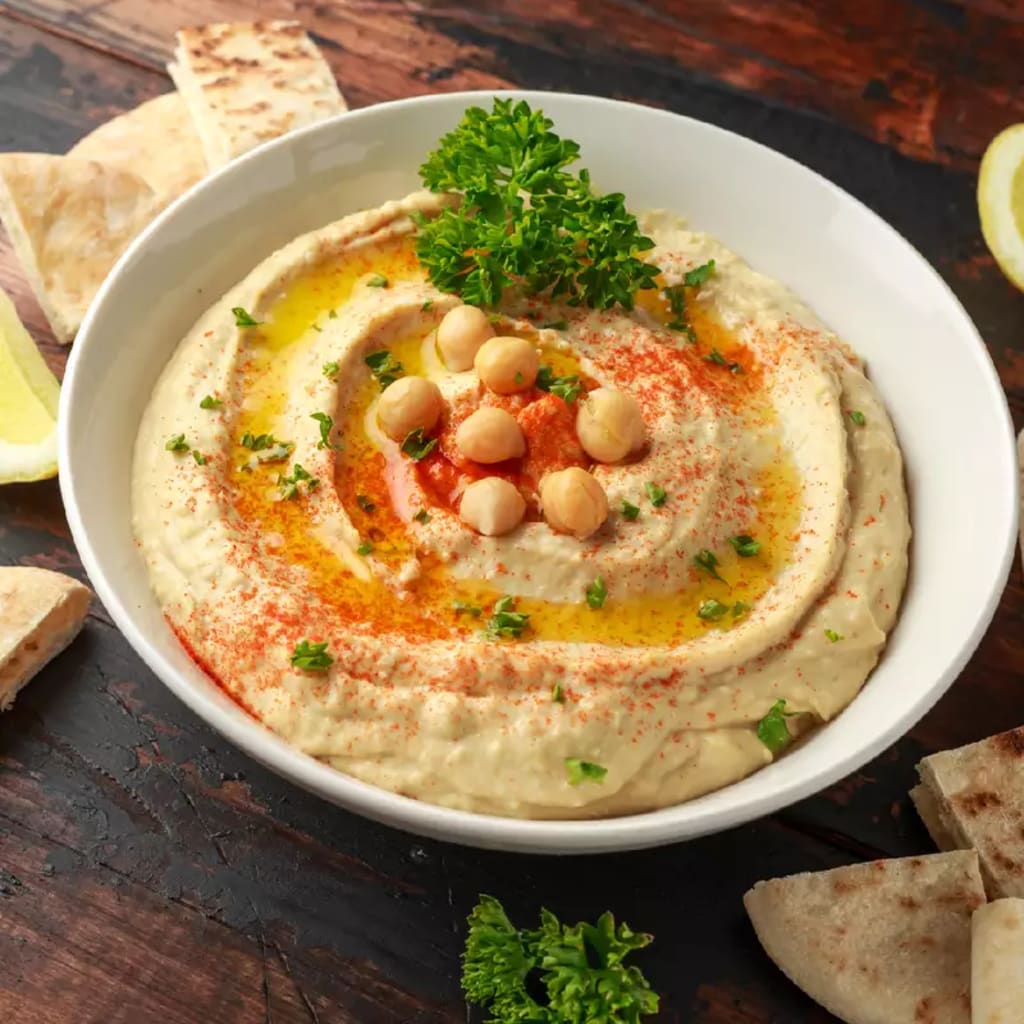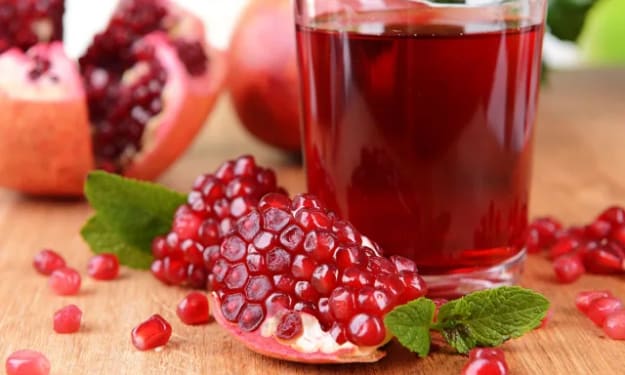Hummus's 10 unexpected health advantages, negative effects, and recipe
This is for you!

The Middle Eastern meal hummus, often called houmous, is created from chickpeas, tahini, garlic, and lemon juice. Traditional Middle Eastern toppings for hummus include olive oil, a few chickpeas, paprika, and parsley. Due to its health advantages, hummus has generated a lot of attention online. This article includes information about the hummus recipe, potential advantages of hummus, and more.
Top 10 health benefits of hummus
1. It is a nutritious food
Hummus's nutritional value is quite high, and a 100-gram serving of hummus provides:
• Calories in hummus: 166
• Protein in hummus: 7.9 grams
• Manganese: 39 percent of the recommended dietary intake
• Fat: 9.6 grams
• Carbs in hummus: 14.3 grams
• Fiber: 6 grams
• Copper: 26 percent of the recommended dietary intake (RDI)
• Iron: 14% of the recommended dietary intake
• Folate: 21% of the recommended dietary intake
• Thiamin: 12% of the recommended dietary intake
• Phosphorus: 18% of the recommended dietary intake
• Vitamin B6: 10% of the recommended dietary intake
• Magnesium: 18 percent of the RDI
• Potassium: 7% of the recommended dietary intake
It is a great choice for those following a vegan or vegetarian diet because it is a rich source of protein and minerals.
Protein in hummus is essential for constructing muscles and boosting the immune system. Additionally, it contains thiamin, folate, potassium, iron, and B vitamins, all of which are crucial for good health.
Overall, it is a fantastic food to incorporate into our diet.
2. It can help in weight loss
People who are wanting to lose weight should include foods with monounsaturated fats in their diet since they help with weight loss and may also lower the risk of heart disease, inflammation, and other conditions.
Tahini, commonly known as sesame seed butter, is typically used to make hummus. Monounsaturated fats included in sesame seed butter aid in weight loss and the reduction of abdominal fat.
One must keep in mind that not all fats are unhealthy, therefore keep healthy fats in your diet and consume hummus, almonds, avocados, chia seeds, and other foods to obtain your daily dose of nutrient-rich fats. Trans fats and polyunsaturated fats should be avoided because they might have a negative impact on your health and cause you to gain weight.
3. It can help people dealing with anemia
A shortage of healthy red blood cells in the body is what causes anemia, a medical ailment. It can lead to severe fatigue, pale complexion, headaches, lightheadedness, inflammation, brittle nails, and a host of other issues. Consequently, it is imperative to routinely consume a diet high in iron.
Tahini and chickpeas, both of which are rich sources of iron, are commonly used to make hummus.
Consume hummus to treat iron deficiency since your body needs enough iron to prevent anemia.
4. It can improve your digestion
Hummus maintains gut health, which is one of its most astonishing health advantages.
Dietary fiber is a crucial component of diet that can prevent stomach issues and enhance digestion.
A serving of hummus by itself provides 24% of the daily fiber recommendation (for women) and 16% for men because it contains 6 grams of dietary fiber per 100 grams of hummus.
Additionally, hummus' high fiber content helps keep you fuller for longer. Additionally, a diet high in dietary fiber promotes smooth, regular bowel movements and nourishes the good bacteria in the stomach.
5. It can help you maintain healthy blood sugar levels
Hummus is so nutrient-dense that it can even assist you in controlling your blood sugar levels. Although it might not be able to cure diabetes, it can definitely help you manage it properly or avoid it. Although it is not a miracle cure, the high protein content keeps you satisfied and reduces food cravings.
6. It can be helpful for people with allergies
A lot of people have allergies to dairy, nuts, and gluten. Finding food that allergy sufferers can eat without worrying about their allergies can be challenging at times. You can eat hummus worry-free because it is free of dairy, gluten, and nuts. Additionally, you can experiment with preparing hummus with various flavors to delight your palate.
After preparing the hummus base, you can customize the flavor by adding your favorite fruits, herbs, veggies, spices, or other ingredients.
7. It has antioxidant properties
Hummus' abundance in antioxidants, which aid to prevent a variety of acute and chronic issues, is one of its main advantages. Traditional hummus is a delicious food to eat frequently since it is made with chickpeas, which are rich in antioxidants.
8. Hummus might lower heart disease risk.
Hummus can reduce the chance of heart issues, which is one of its many health advantages.
Vitamins, potassium, folate, and other vital nutrients that lower risk factors for heart disease are abundant in hummus.
Healthy adults were requested to participate in a five-week trial where they were given the option of eating a diet with extra wheat or chickpeas. After the trial was over, it was shown that adults who consume a diet that includes additional chickpeas had bad cholesterol (LDL cholesterol) readings that were 4.6% lower.
In addition to chickpeas, hummus also contains olive oil, a fantastic source of good fats. Hummus is a fantastic food for everyone because olive oil is one of the finest oils for the heart.
9. It is a great substitute for junk food
Despite the fact that junk food is wonderful, it is bad for everyone's health. While the occasional indulgence in junk food is OK, frequent consumption can result in cardiac issues, digestive issues, inflammation, and other issues.
A dish that you can use in place of mayo is hummus. Additionally, you may use it as a salad dressing by combining it with water or broth. Hummus can also be used as a dipping sauce for raw vegetables. Hummus can be used in a variety of ways into your daily healthy eating plan.
10. It can help in reducing inflammation
Sesame seeds, which are found in hummus, aid in lowering bodily inflammation.
Arthritis, digestive issues, and cardiac issues can all be brought on by inflammation. Consuming a diet high in anti-inflammatory foods is crucial since chronic inflammation in the body raises the risk of accidents and infections.
These were the top ten health advantages of hummus that we needed to be aware of. However, is hummus always wholesome? The response is no! Hummus should be consumed in moderation to avoid its negative effects because anything in excess can be harmful to our body.
Side effects of hummus
1. It can increase sodium levels in the body
Consuming an excessive amount of sodium can raise cholesterol levels, result in high blood pressure, and possibly trigger a stroke. Hummus has a large amount of sodium, so you should be careful while consuming it in excess. Check the nutrient value of the hummus before purchasing it as some of the pre-made varieties on the market have higher salt contents than what we should consume on a daily basis.
Additionally, you should avoid eating hummus regularly if you have high blood pressure or heart issues.
2. It has high potassium levels
The same is true for potassium; eating too much of anything can lead to issues. You should limit your intake of hummus because it is high in potassium and some drugs, such beta-blockers, raise the levels of potassium in the body. If you are taking such medications.
3. It may cause allergies
You should avoid eating hummus if you have a tahini or chickpea allergy.
Consult a doctor right away if you feel queasy, nauseous, or itchy after consuming hummus.
4.kidney stones
Most frequently, chickpeas are used to make hummus, and oxalates, which are found in chickpeas, are excreted from our bodies through urine. Oxalate levels may rise as a result of excessive hummus consumption, and if oxalate begins to accumulate in the kidney, it may result in kidney stones. So, consume hummus in moderation if you have renal issues or are more likely to develop a kidney stone.
5. Weight gain
Hummus when eaten in moderation can aid weight loss, but tahini and olive oil used to make hummus contains fats. Although these are healthy fat when taken in high doses, they can make you gain weight.
Moreover, if you consume store-bought hummus, you should always check the label to see its nutrition content, because some ingredients in the pre-made hummus can cause weight gain.
6. IBS
Chickpeas, one of the main ingredients in hummus, can be hard for some people to digest. See a doctor if you have stomach pain, nausea, vomiting, acid reflux, or bloating after ingesting hummus because many people with IBS and weak digestion cannot take chickpeas well.
7. Excess iron and folic acid
Hummus contains iron and folic acid, and consuming both of these components in excess can cause a bitter taste in the mouth, bloating, nausea, sleep problems, trouble concentrating, constipation, vomiting, and dark stools.
8. Unhealthy ingredients
When eaten in moderation, hummus is a healthy snack, but if you don't have the time or energy to make your own, you should verify the ingredients before using store-bought hummus.
Each brand of hummus sold on the market contains additional ingredients, some of which have excessive sodium or sugar content and might eventually cause a number of issues.
Some businesses also add artificial flavors, preservatives, and additives to their products, turning them into harmful snacks. Traditionally, hummus is produced with olive oil, although some brands make less-than-healthy versions with soybean or sunflower oil.
So while it is true that there are many health benefits of hummus, you should try making hummus at home to reap all its benefits.
Now that we know all about the hummus benefits and its side effects, let us take a look at an easy hummus recipe.
How to make hummus?
Learn to make homemade hummus with this best hummus recipe.
Ingredients to be used:
• 1 can of garbanzo beans, also known as chickpeas (drained, liquid reserved)
• 1 tablespoon of freshly squeezed lemon juice
• 1 tablespoon of extra virgin olive oil
• 1 clove garlic
• 1/2 teaspoon of ground cumin
• 1/2 teaspoon of salt
• 2 drops of sesame oil
Method
Crush a garlic clove well in your hand. Then, in a food processor, combine the garbanzo beans, olive oil, garlic, salt, sesame oil, olive oil, and lemon juice. Then, while the mixture combines, stream in the reserved garbanzo bean liquid until you achieve the required consistency.
You may attempt this easy, quick, and straightforward hummus recipe at home.
Due to its high nutritional value, hummus should be included in your healthy eating regimen. But to avoid its negative consequences, don't overdo it. Stay fit and happy by eating well!
About the Creator
Enjoyed the story? Support the Creator.
Subscribe for free to receive all their stories in your feed. You could also pledge your support or give them a one-off tip, letting them know you appreciate their work.





Comments
There are no comments for this story
Be the first to respond and start the conversation.